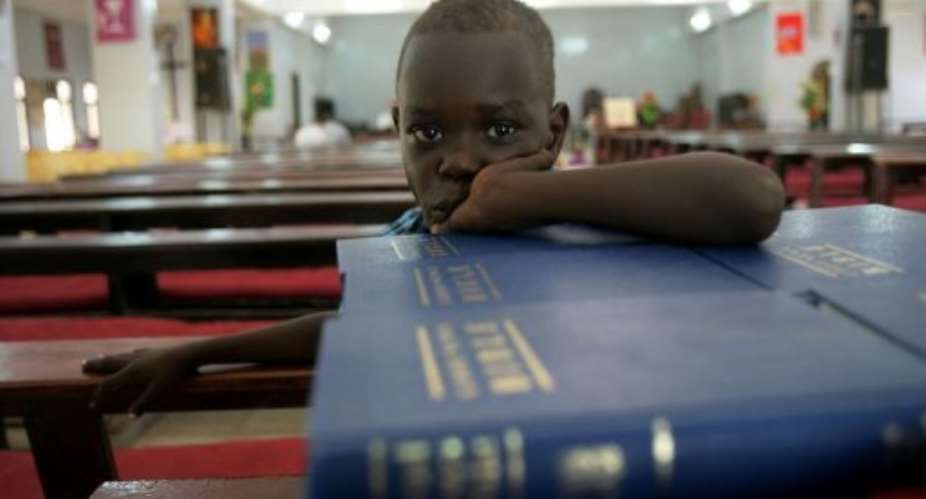KHARTOUM (AFP) - Uncertainty and confusion faced an estimated half a million ethnic South Sudanese on Sunday, the deadline for them to leave Sudan or formalise their status in the country.
Southern officials sent to Sudan have been reassuring their people and telling them not to panic, a non-governmental worker said, as Sudan's Interior Minister, Ibrahim Mahmoud Hamid, confirmed the deadline.
The minister said police stations would be open for those wishing to register as northern residents, the official SUNA news agency reported.
But officers at two stations told AFP they had only heard about the initiative on the news, and no Southerners were there to register.
The April 8 time limit ended a grace period after South Sudan separated last July in the wake of an overwhelming "yes" vote in an independence referendum that followed Africa's longest civil war.
The 22-year conflict killed two million people and drove many more to the north.
While hundreds of thousands have already returned to the South, an estimated 500,000 others remain in Sudan, waiting for clear direction on what to do.
Confusion remains especially among the many Southerners who have not been able to obtain South Sudanese passports, said reverend Iskander Ali, an ethnic Southerner who preaches at All Saints Episcopal Cathedral in Khartoum.
Those seeking to apply for northern residence need documents from South Sudan but many cannot afford a trip South to get their papers.
A few Southerners waited outside the South's diplomatic mission in Khartoum but a security officer said registration there had not begun.
More than 11,000 Southerners have been living for months in makeshift shelters at the Kosti way-station south of Khartoum, waiting for transport home. Others have been waiting in the capital itself.
"Until now they didn't get the right answer, when are they going to travel. Because they don't know who is going to take care of them, the government of South Sudan or the government of Sudan," Ali said.
"They don't really know what is going to happen to them," he added. "Is the government going to kick them out?"
Jill Helke, chief of the local International Organisation for Migration (IOM) mission, said officials from the South have been in Sudan to tell their people: "Don't panic."
The deadline fell on Easter Sunday, one of the holiest days for the mostly Christian Southerners, and also during a period of high tension between Sudan and South Sudan.
Border clashes that erupted two weeks ago between the two neighbours in the most serious unrest since Juba's independence have prompted international fears of a return to full-blown conflict.
African Union mediator Thabo Mbeki held talks late last week over the crisis with South Sudan's President Salva Kiir and his Sudanese counterpart Omar al-Bashir.
During the Khartoum meeting Mbeki and Bashir also discussed the future of the Southerners still in Sudan. Mbeki said Bashir noted the hospitable nature of Sudanese people and said there is "no reason for fear" among the Southerners.
Canon Sylvester Thomas, the dean of All Saints, flew on Saturday to the South Sudanese capital Juba to obtain his passport and said by telephone that he plans to return to Khartoum in hopes of registering.
"So far, we don't know what's next," Thomas said. "We don't know how we are going to regularise our status."
"There are so many Southerners who would like to stay," either because they are still working in the north, are former civil servants waiting for severance pay or, like Thomas, have children in university or other schools, he said.
The Khartoum government fired ethnic Southern members of its civil service before the South's independence.
Under a "framework agreement" signed by negotiators last month, nationals of each country have freedom of residence, movement and economic activity in the other state. The pact still requires higher-level endorsement from each nation.
Since last year the IOM has helped return more than 23,000 Southerners, mostly by river barge, and Helke said the IOM is currently registering people for another barge journey from Kosti.
Southerners travelling home on the river or by train do not require documentation.
Sudan and South Sudan have also organised some transport themselves.





 Akufo-Addo commissions Phase II of Kaleo solar power plant
Akufo-Addo commissions Phase II of Kaleo solar power plant
 NDC panics over Bawumia’s visit to Pope Francis
NDC panics over Bawumia’s visit to Pope Francis
 EC blasts Mahama over “false” claims on recruitment of Returning Officers
EC blasts Mahama over “false” claims on recruitment of Returning Officers
 Lands Minister gives ultimatum to Future Global Resources to revamp Prestea/Bogo...
Lands Minister gives ultimatum to Future Global Resources to revamp Prestea/Bogo...
 Wa Naa appeals to Akufo-Addo to audit state lands in Wa
Wa Naa appeals to Akufo-Addo to audit state lands in Wa
 Prof Opoku-Agyemang misunderstood Bawumia’s ‘driver mate’ analogy – Miracles Abo...
Prof Opoku-Agyemang misunderstood Bawumia’s ‘driver mate’ analogy – Miracles Abo...
 EU confident Ghana will not sign Anti-LGBTQI Bill
EU confident Ghana will not sign Anti-LGBTQI Bill
 Suspend implementation of Planting for Food and Jobs for 2024 - Stakeholders
Suspend implementation of Planting for Food and Jobs for 2024 - Stakeholders
 Tema West Municipal Assembly gets Ghana's First Female Aircraft Marshaller as ne...
Tema West Municipal Assembly gets Ghana's First Female Aircraft Marshaller as ne...
 Dumsor is affecting us double, release timetable – Disability Federation to ECG
Dumsor is affecting us double, release timetable – Disability Federation to ECG
